Last year’s Moscow International Film Festival (MIFF) played out in the shadow of conflict in Ukraine and Russia’s annexation of Crimea, and a year on you could be forgiven for wondering if anything’s really changed. International sanctions remain in place – in fact they were renewed for another six months right in the middle of MIFF’s late-June run, and much alluded to by festival president Nikita Mikhalkov throughout proceedings.
Funding issues reflecting Russia’s economic recession saw the festival itself shortened by two days, and its main competition programme reduced to a dozen films. Not that that really hit home, however, given that the section is normally MIFF’s weakest link: in fact the 12 films that did make it to Moscow this year actually looked a rather stronger slate than usual, including three Russian titles (of which more later) which certainly held their own. And if anything the range of traditionally popular supporting programmes assumed new importance, given that the rouble’s fall over the last year has dramatically cut the number of arthouse and independent films being released by local distributors, so MIFF to some extent reverted to the "window on the world" role it had through the Nineties, when distribution of anything except Hollywood product was virtually non-existent.
'Let all flowers bloom, but we will only water those we like, or those we consider necessary,' Medinsky said
Some things never change, though: as usual, the distinct Russian programme, collecting the best of the year’s films (some already released, others still to premiere), at Moscow’s Dom Kino drew audiiences that packed the 1,300-seater to bursting point. That’s the place where the specialists, Russian and international alike, gather to take the temperature of the local production scene, as well as, inevitably, to ponder the wider social and political climate in which Russian culture exists today.
One of more interesting strands to have appeared at MIFF in recent years has been an international documentary sidebar titled “Free Thought”, a phrase that seems very relevant to what’s going on today: a week before MIFF opened, the country’s Minister of Culture Vladimir Medinsky delivered his most detailed thoughts to date on Russia’s cultural policy, which certainly prompted some reflection when watching some of the country’s latest cinematic offerings.
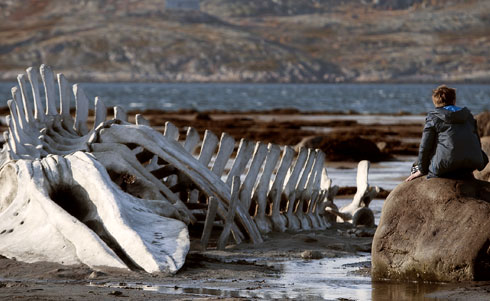 It was Medinsky who delivered the celebrated mission statement – “Let all flowers bloom, but we will only water those we like, or those we consider necessary”– at the Cannes festival last year in relation to director Andrei Zvyagintsev’s most recent film, Leviathan (pictured above). His latest ruminations, published in national newspaper Izvestiya in the middle of June, essentially elaborated on that laconic dictum and went further in defining what he saw as necessary priorities for state "investment" in culture: Medinsky does indeed use such market terms to frame his argument, though they’re combined with a rather heady philosophical slant that sometimes almost defies translation.
It was Medinsky who delivered the celebrated mission statement – “Let all flowers bloom, but we will only water those we like, or those we consider necessary”– at the Cannes festival last year in relation to director Andrei Zvyagintsev’s most recent film, Leviathan (pictured above). His latest ruminations, published in national newspaper Izvestiya in the middle of June, essentially elaborated on that laconic dictum and went further in defining what he saw as necessary priorities for state "investment" in culture: Medinsky does indeed use such market terms to frame his argument, though they’re combined with a rather heady philosophical slant that sometimes almost defies translation.
His main arguments for Russia's cultural development centred on discussion between its creative classes, structures of power and wider society, based on necessary values that he defined into six categories: “the value of co-creative work; personal development as a guarantee of shared prosperity; service of the Fatherland; the unity and continuity of the thousand-year history of Russia; the historical unity of the fate of the peoples of Russia and friendly nations, many of which were part of the Russian Empire or the Soviet Union; and the values of family and human society, with Orthodoxy treated equally with all the traditional religions in Russia, beginning with respect for the older generation and ending with the principles of raising children.”
Quite an ideological mouthful, and if it leaves you wondering just what Medinsky is talking about, you’re not the only one. Playwright and film director Ivan Vyrypaev felt much the same writing in Izvestiya a week later, and was most of all puzzled by the question as to who exactly would adjudicate Medinsky’s categories. But Vyrypaev’s wider summing-up was admirably succinct: “This means that [the state] has the right to intervene, to control, direct, grow, regulate, monitor, and finally to develop the cultural process. It means that the state assumes the role of a kind of spiritual and educational shepherd for the people.”
State support for culture won’t be going to projects which portray Russia in a negative light
At the risk of simplifying Medinsky’s elaborately erudite theses, it might be said to boil down to: he who pays the bills calls the shots. It also allowed him a rather cheap jibe at the situation in the 1990s and 2000s, when, he wrote, “under the pressure of the ‘creative elite’ and to the slogan of ‘a decisive break with the totalitarian Soviet past’… [a kind of] phantasmagoria reigned: ‘We want things like they were under Stalin – only without Stalin.’ That is, the state must retain its total and unconditional commitment to financing creative work – but the recipients of this ‘cash allowance’ are generously relieved of any obligations whatsoever.”
Not any longer. State support for culture won’t be going to projects which portray Russia in a negative light (Medinsky has included Zvyagintsev’s Leviathan in that category, so the director wouldn’t be likely to receive the element of state funding that he did for that film, Cannes prize, Golden Globe victory and Oscar nomination notwithstanding). A glance at the Culture Ministry’s website reveals its top priorities for state support for cinema this year: “inspirational success stories; Crimea, Ukraine and the thousand-year history of Russian statehood; and the military glory of Russia, which is being trumpeted this year on the 70th anniversary of the Soviet victory over Nazi Germany.” Reactionary though that may sound, it’s still not the full story: another main direction for state funding has been that hard-to-define genre the “national blockbuster”, which can equally be a comedy as one of the more traditional “big history” movies which primarily try to trump Hollywood at the box office, something which this year’s harvest of Great Patriotic War anniversary films has singularly failed to do. (And if Russia can’t beat Hollywood on audiences, it never stops considering restrictive legislation to achieve similar results: the idea of imposing a quota on foreign cinema regularly crops up in Russia’s parliament, the Duma – though almost everyone in the film industry itself cries out against it – while Medinsky’s latest proposal is to levy VAT ticket sales for foreign films, in a nominal attempt to increase funding for domestic productions.)
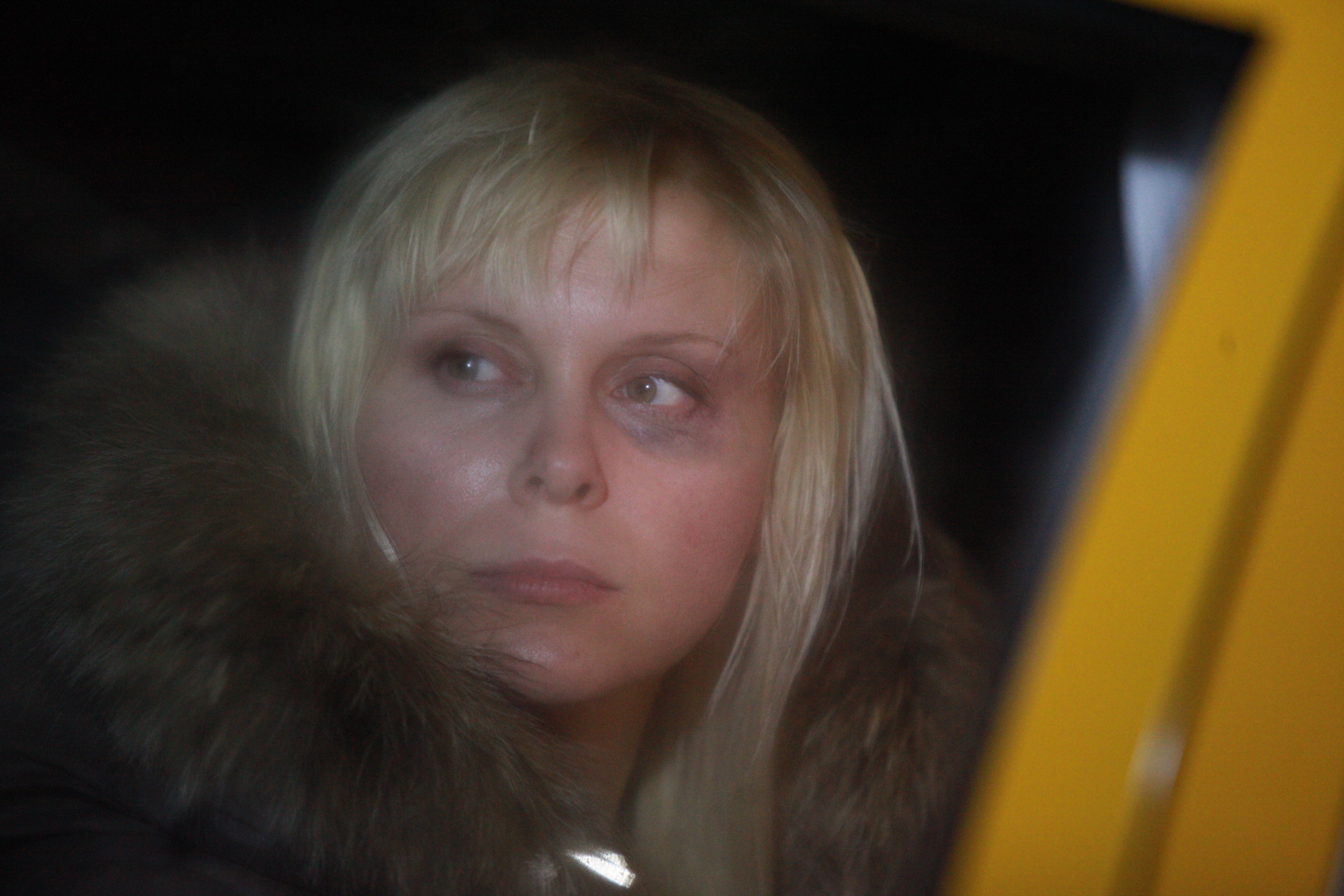 So what about those directors and producers who don’t bother with state support and fund their films privately? One of the most talked about films in the MIFF Russian programme was The Land of Oz, an exaggerated, dark comedy of provincial Russia by Vasily Sigarev that hardly shows life in the country in a rosy light (lead actress Yana Troyanova, pictured above). The director has spoken of how he consciously stuck to the principle, “not a kopeck from the Ministry of Culture, so that I couldn’t end up with a single pretension directed at me by the state. Creative freedom – not on state funding.” I wasn’t that keen on The Land of Oz, finding its comedy based more on a pronounced cynicism rather than anything more generous, but other critics were won over by it, and viewer reactions were certainly good. So will it be the next national blockbuster?
So what about those directors and producers who don’t bother with state support and fund their films privately? One of the most talked about films in the MIFF Russian programme was The Land of Oz, an exaggerated, dark comedy of provincial Russia by Vasily Sigarev that hardly shows life in the country in a rosy light (lead actress Yana Troyanova, pictured above). The director has spoken of how he consciously stuck to the principle, “not a kopeck from the Ministry of Culture, so that I couldn’t end up with a single pretension directed at me by the state. Creative freedom – not on state funding.” I wasn’t that keen on The Land of Oz, finding its comedy based more on a pronounced cynicism rather than anything more generous, but other critics were won over by it, and viewer reactions were certainly good. So will it be the next national blockbuster?
Not in its existing form, at least. The screen ban on expletives – known in Russian as mat’, the rich vein of expression that’s much more visceral than swear-words in English – that came into effect exactly a year ago means that Oz can only be released in an edited form (the expletive-rich Leviathan underwent such pruning, too). Not least because Sigarev throws in ripe vernacular to a degree that sometimes seems almost parodic, when it isn’t gratuitous. Appeals on this score over the last year to Medinsky’s ministry from some of the top names in Russia’s film world – among them Mikhalkov and Fyodor Bondarchuk – have been turned down: effectively they were pleading for a degree of discretion with regard to expletives, to allow room for exemptions when an extreme dramatic context might justify them. (Any such film obviously also goes out with an “18” age-rating, which seemed to be the category attached to almost everything in the Russian programme.)
Ther various roundtable discussions on the expletives issue at MIFF last year basically came down to the question of whether the ban was a form of censorship of artistic expression, or a necessary reinforcement of morality in a society which, in the two decades since the collapse of the Communism, has experienced more extreme change at every level than other countries have seen in centuries. The issue is made more extreme by the prominence that the Russian Orthodox Church has assumed in recent years, cementing that new status through its closeness to the Kremlin. (You only have to remember the Pussy Riot story from three years ago to see that pairing in action.)
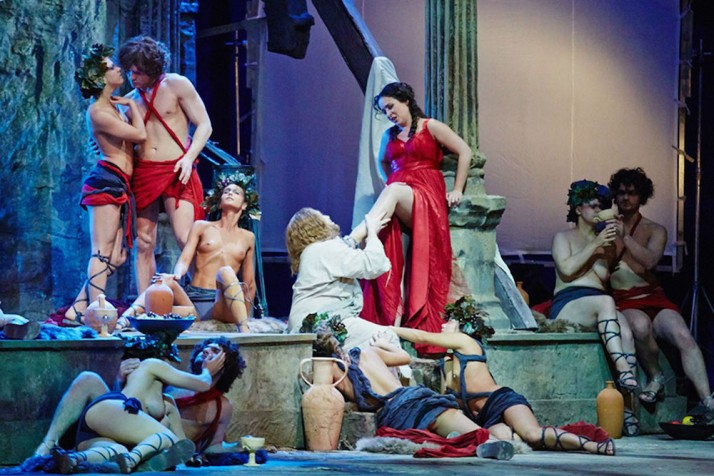 Thus, the main cultural scandal of the first half of this year involved a production of Wagner’s Tannhäuser by Novosibirsk’s opera and ballet theatre (pictured above), which included a scene with a poster iamge of the naked Christ in a context which the Church took exception to (it was never really clear whether the initial objection came from an actual viewer, or whether the controversy was effectively cooked up within the local Church hierarchy). Following protests by believers, as well as by city residents who came out to stand up for artistic freedom, outside the theatre, Medinsky fired its management, referring to the incident thus: “The ministry’s mistake wasn’t that we fired the administrative director who didn’t think it necessary to enter into a dialogue with society – the mistake was that we took too long to do so. And the way the whole thing should have happened would be that a production like this would be rejected when such an idea was initially proposed.” As for Timofei Kulyabin, who staged the production, he duly received invitations from some of Moscow’s top venues, the Bolshoi included, to work there.
Thus, the main cultural scandal of the first half of this year involved a production of Wagner’s Tannhäuser by Novosibirsk’s opera and ballet theatre (pictured above), which included a scene with a poster iamge of the naked Christ in a context which the Church took exception to (it was never really clear whether the initial objection came from an actual viewer, or whether the controversy was effectively cooked up within the local Church hierarchy). Following protests by believers, as well as by city residents who came out to stand up for artistic freedom, outside the theatre, Medinsky fired its management, referring to the incident thus: “The ministry’s mistake wasn’t that we fired the administrative director who didn’t think it necessary to enter into a dialogue with society – the mistake was that we took too long to do so. And the way the whole thing should have happened would be that a production like this would be rejected when such an idea was initially proposed.” As for Timofei Kulyabin, who staged the production, he duly received invitations from some of Moscow’s top venues, the Bolshoi included, to work there.
So we can only wonder what Medinsky might have made of the three Russian films in the MIFF competition, Alexander Mindadze’s My Good Hans, Andrei Proshkin’s Orleans, and Irina Evteeva’s Arventur. Actually, we don’t have to guess in the case of Mindadze’s film, since back in 2013 Medinsky very publicly refused Ministry of Culture funding for the German-Russian co-production, on the grounds that the era in which it was set, 1939, just after the Molotov-Ribbentrop pact, and its story, of German scientists working at a Soviet factory research facility, involved “a most complicated historical period”. That kicked up a scandal in the press, not least because the film already had its German funding in place, and Medinsky was recommending further ideological consultation on the subject, not least from his favourite Military-Historical Society, which seems to have become the first-stop point of referral for anything with a historical subject. My Good Hans did eventually receive Russian funding from another state body, with Mindadze (pictured below), a much-respected veteran screenwriter for whom this was his third feature as director, today playing down its backstory, denying that any recommendations received were connected to censorship, rather matters of taste. I thought My Good Hans as good as anything in the MIFF competition, though the jury passed it over for awards. With British funding involved, the film appears already to have a UK distributor, which is good news.
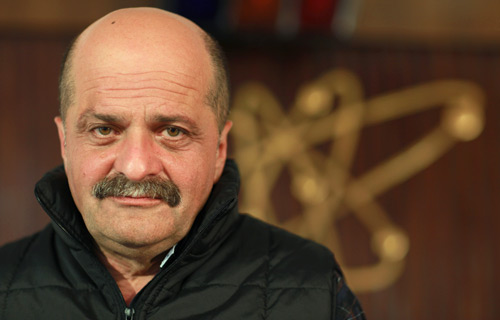 I can’t see Medinsky liking Proshkin’s Orleans much either, though it received the Best Actress award for Elena Lyadova: from a script by regular Alexander Sokurov collaborator Yury Arabov, who’s come up with some of the more acerbic visions of contemporary Russia in recent years, its story of society’s moral and spiritual degradation is only partly alleviated by its being set in a loosely fabular context. Emphatically not a work which, when it hits other international festivals, will conjure up a positive view of the country in the way that Medinsky demands. As for Evteeva’s Arventur, which took the jury’s special prize, it’s a film of remarkable aesthetic concentration which uses the complicated, time-consuming paint-on-glass animation technique to embellish images initially shot with actors and the basics of backgrounds.
I can’t see Medinsky liking Proshkin’s Orleans much either, though it received the Best Actress award for Elena Lyadova: from a script by regular Alexander Sokurov collaborator Yury Arabov, who’s come up with some of the more acerbic visions of contemporary Russia in recent years, its story of society’s moral and spiritual degradation is only partly alleviated by its being set in a loosely fabular context. Emphatically not a work which, when it hits other international festivals, will conjure up a positive view of the country in the way that Medinsky demands. As for Evteeva’s Arventur, which took the jury’s special prize, it’s a film of remarkable aesthetic concentration which uses the complicated, time-consuming paint-on-glass animation technique to embellish images initially shot with actors and the basics of backgrounds.
An unreservedly elite-oriented work of art from which issues of wider society are simply absent, Arventur looks as far from contemporary realities as can be imagined. It would be unfair, though, to see Evteeva as escaping into aesthetics: rather she belongs at one end of the Russian artistic spectrum, at the opposite pole to directors, both in film and theatre, who engage directly with their immediate environment. In between those extremes there lies a much broader middle-ground which takes in the commercial and mainstream. In Russia, however, the spectrum of audiences concerned, from the liberal, younger ones of Moscow and a few other large cities whose cultural tastes match those of their contemporaries anywhere else in Europe, to the traditional attitudes of the older generation in remoter regions, is surely wider than in much of the rest of world. (Even the Internet hardly bridges that range of diverse attitudes, in fact if it’s connected by anything it’s by the lowest common denominator of television, which in the case of some of Russia’s national channels comes very low indeed.)
At least Medinsky does admit that cultural development through history inevitably sees the appearance of the experimental (whether the avant-garde in formal terms, or rejection of the status quo in societal terms) that over time sees such break-through movements assimilated into a broader process. It’s a kind of re-balancing act not far from that noted by Vyrypaev. He challenged the minister’s category of “serving the Fatherland” by recalling the ranks of now-classics – from Tolstoy to Pushkin, Gogol to Dostoevsky – who were hardy models of loyalty to the regime, in their time censored or exiled by the-then authorities.
Teatr.doc has not had a good year, to put it mildly
And yet, and yet… There was another mention of theatre, after the Novosibirsk Tannhäuser, in Medinsky’s manifesto, that referred to a production in the north-western city of Pskov, with a tone so mired in a Soviet mind-set that it deserves to be quoted in full: “However, the monopolisation of culture by the closed caste of the ‘creative classes’ is absolutely no better. Freedom, and fresh blood, and the frequent thirst for understanding reality, is equally alien to them. The recent conflict over the play The Bathhouse Attendant in Pskov is a case in point. Using the innovative theatrical ‘verbatim’ technique (a production based on interviews with real people), a fashionable contemporary director put together so sectarian a depiction of the country and the inhabitants of Pskov that the theatre’s cast was insulted and revolted.” Medinsky apparently received a letter of complaint signed by 15 members of the Pskov troupe, and duly hot-footed it there: the attraction of stamping down on moral “infringements”, at the request of the tvorchesky kollektiv, or “creative collective”, concerned no less, really does bring echoes of another age. Among the accusations against the production were some familiar ones, involving nudity (the production being set partly in a banya, after all) and bad language, though director Varvara Fayer has made it clear that she presented two different versions of the text to the theatre, one with all expletives excised.
The rich irony of Medinsky's disdainful mention of this episode from Pskov lies in the fact there’s a far more prominent example of this kind of theatre (one he clearly doesn't warm to) going on right under his nose in Moscow, and being treated with similar hostility. The Teatr.doc company has been a bright, independent presence on the Russian capital’s theatrical scene since its foundation more than a decade ago. Many of its frequent productions have been based on stories from real life (hence the “doc” in its title), sometimes touching on politically-related themes, and often using the same verbatim technique to create them. (The company has toured internationally, and has had a UK link from the beginning: its director Yelena Gremina was an initiator of Russian contact with the Royal Court’s international writing programme, which has included readings of new plays from both Vyrypaev and Sigarev, with the latter's Plasticine going on to win an Evening Standard award).
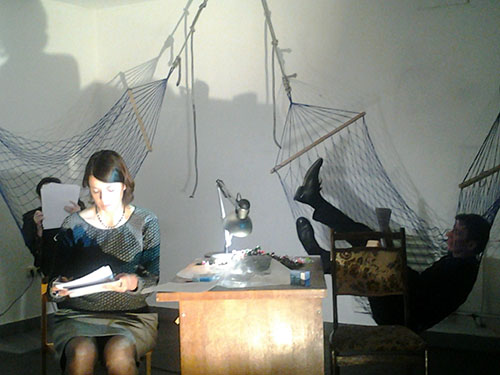 Teatr.doc has not had a good year, to put it mildly. Forced out of their original premises at the end of last year, they duly found another location (and renovated it completely), reopening in February, only to have that lease terminated at the beginning of May. Their final production there, and the one that probably precipitated that second eviction, was The Bolotnaya Case (pictured above), a verbatim-assembled piece based on the stories of those arrested for being involved in protests around the time of Vladimir Putin’s return as Russian president in May 2012 (the gathering point for such opposition meetings was Moscow's Bolotnaya Square). The landlord of Teatr.doc’s second venue admitted he was responding to pressure from the state, which Gremina has said was coming from the Interior Ministry and police, without hinting at who higher up might be behind such actions. She stressed that the investigations didn't follow complaints from citizens, and the company’s regular audiences are hugely loyal, not only contributing financially to keep it going, but even turning up to help with the remont. Vyrypaev's reference in his Izvestiya article – “Teatr.doc has a powerful feeling of unity with that group of citizens which it serves” – if anything errs towards understatement.
Teatr.doc has not had a good year, to put it mildly. Forced out of their original premises at the end of last year, they duly found another location (and renovated it completely), reopening in February, only to have that lease terminated at the beginning of May. Their final production there, and the one that probably precipitated that second eviction, was The Bolotnaya Case (pictured above), a verbatim-assembled piece based on the stories of those arrested for being involved in protests around the time of Vladimir Putin’s return as Russian president in May 2012 (the gathering point for such opposition meetings was Moscow's Bolotnaya Square). The landlord of Teatr.doc’s second venue admitted he was responding to pressure from the state, which Gremina has said was coming from the Interior Ministry and police, without hinting at who higher up might be behind such actions. She stressed that the investigations didn't follow complaints from citizens, and the company’s regular audiences are hugely loyal, not only contributing financially to keep it going, but even turning up to help with the remont. Vyrypaev's reference in his Izvestiya article – “Teatr.doc has a powerful feeling of unity with that group of citizens which it serves” – if anything errs towards understatement.
It’s just renovated a third location, and promises a full new season there. Its most recent appeal, on a crowd-funding platform at the beginning of July, included a list of pledges made by the company in return for public support, including: “Teatr.doc undertakes to continue to stage plays, in which acute and urgent social issues are investigated.” Whether they will be allowed to, only time will tell, and the result will reveal much about the future chances of genuinely free thought existing and developing in Russia’s current cultural context. Apart from anything else, it seems a short-sighted gesture from the authorities to drive such an enterprise, operating on the small scale that it does, largely without publicity, and catering to a strand of society which is already oppositionally-minded, out of existence: even in Soviet times, major Moscow theatres like Yury Lyubimov’s Taganka and Galina Volchek’s Sovremmenik were effectively allowed to push the limits of what was acceptable, not least as a sort of pressure valve to allow society to let off steam. To return pessimistically to Medinsky’s horticultural adage, “Let all flowers bloom…”, it can only be hoped that Teatr.doc, “watered” as it is only by the loyalty and suppport of its audiences, won't have its roots pulled up altogether.















Add comment